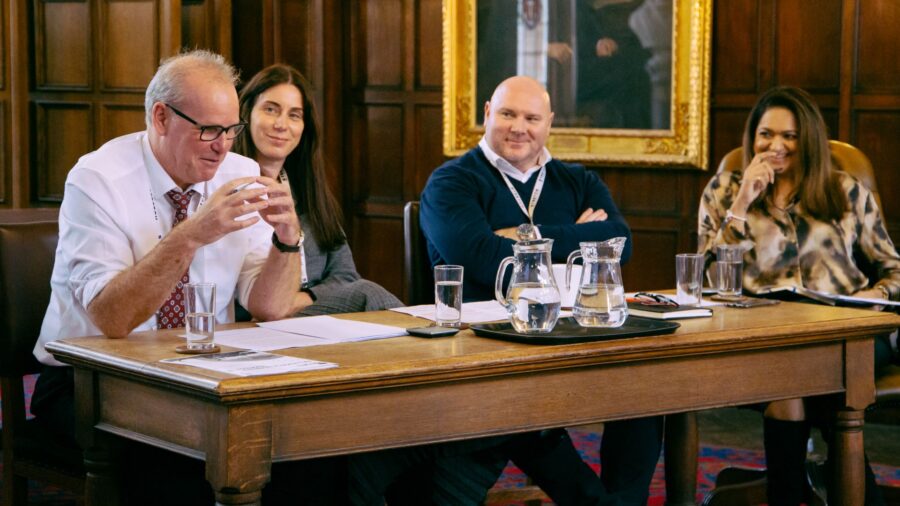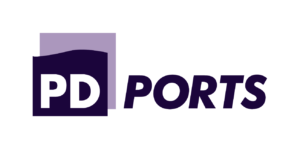
Senior leaders from across PD Ports joined together to give examples of best practice and shine a light on their personal experiences in the workplace as part of a Women’s Network Group event.
The panel of speakers – Rachel Beeken, business unit director – unitised; Christopher Leonard, business unit director – warehousing and David Wilson, general manager for human resources – hosted by Raj Kehal-Livi, from Women in Ports, to discuss issues face women in male-dominated workplaces and changes they’d like to see.
The event, held at Queens Square, was organised by Patti Burt, chair of the PD Ports Women’s Network Group and senior business development manager, as part of a series of talks to empower women in the business and promote discussion and collaboration in the business.
Among the discussion points raised at the event were the gender imbalance in the port sector, both at PD Ports and nationally, the barriers faced by women in the workplace, the importance of role models and mentors, imposter syndrome and the role men can play to be better allies to female colleagues.

Gender imbalance
David Wilson noted that his profession, HR, is dominated by women – some 71% of HR professionals are women.
He said: “I’ve been led by and mentored by very strong women which helped my development.
“When I came to PD Ports, only 8% of the workforce were women, all in admin positions, in finance or as secretaries.
“Today, we’re at 15%, which is in line with the national average, but there is more work to do.
“How do we get the message out there to young women – and to young men – that the port sector can offer them an amazing career path? For too many people the environment appears to feel hostile and ‘not for them’.”
Christopher Leonard admitted that he hadn’t thought much about the gender imbalance in his earlier career in logistics but had started to recognise the issue on joining PD Ports eight years ago.
He said: “I started to see the pockets of success at PD Ports, with women working their way into strong positions based on their performance. Some of the better leaders we have are female – it takes a lot of resilience to get into the position they have.
“I think things will get better and stronger for women in the company. We’re more aware than we ever were of what we have to do.”
Rachel Beeken was then asked about her experiences in a career in logistics, which saw her start out in a warehouse in Scotland as the only woman on the shift.
She said: I was probably quite naïve when I started out. However I did have a female boss in that role and she was perceived as being hard and difficult, she had a certain reputation in the business.
“She clearly felt that she had to be that way, 20 odd years ago to get to where she was. She had to show that she could make hard decisions but as I worked with her I learned it was a front to get by.
“When I joined PD four years ago, arguably the gender imbalance here was worse than I’d seen in logistics. I was the only woman in a leadership position at the time.
“In the first meeting I had at Billingham I was the only woman in the room – 30 men just staring at me. They didn’t know who I was or where I’d come from, I was new to the region, and I just had to break down that initial barrier by showing them that I’m a normal person.
“You’ve got to find your own way and earn respect for who you are.

Do men recognise the barriers faced by women?
Chris Leonard gave an example of an incident in a crisis simulation exercise, when an answer given by a woman – a senior leader and the only person in the room who knew the answer – was ignored and dismissed.
He added: “It was really quite sad to see that happen and we need to make sure it never happens again.
“Forums like this and the work that’s going on internally around the business are so important and are already making a difference.
“We want people to develop their careers and do their best and we’ll do the same for them in return, whether they’re male or female.
David Wilson added: “One area where we can have an impact with is in succession planning – how can we help individuals to move forward in the business and develop? Who is best placed for a job with their skillset and how can we help them progress to more senior roles?
“The things we experience here are not unique to PD Ports – ports and maritime exist in a bubble, the sector does things how it’s always done them. We need to break out of the bubble and look at how the rest of the world does things.”
Are there different expectations of female leaders?
Rachel said: “Not necessarily, it depends on your boss and the people above you and how they support you and manage wider expectations.
“In previous jobs the main issue was that too often I arrived for a meeting and the assumption was that I was from HR, not the person there to lead the meeting, and that the most senior person in the room is automatically a man.
“I don’t get that here at PD – there are the same expectations across the board for all leaders.”

Do all women suffer from imposter syndrome?
Rachel Beeken said: “I definitely recognise that, that feeling that you’re not good enough or that what you’re being asked to take on is too much.
“When I was asked to take on this role I certainly thought I couldn’t do it. I always wonder if male colleagues feel the same way.
“I think of it that if there’s a list of ten things needed to do a job, I’d look at it and think – there are five that I can’t do. A man would look at the list and think – there are five things I can do. It’s a mindset.
“You have to be confident in your abilities and make people who work for you feel safe and secure in their environment and give them the courage to play to their strengths.”
What role can men play to be better allies to their colleagues?
Chris Leonard said: “As a senior leader in this business you have everything in your power to change things.
“If we want to change the number of women in the business it’s got to be driven by men, at least at first. Once there’s a momentum gathered then it can be taken on by the women that have come through.
“We can see people who work hard and have talent – we can promote internally, to roles that will challenge and develop them. We have to back people and put our trust in them.
David Wilson also raised the importance of challenging inappropriate comments or ‘banter’ that might see female colleagues feel uncomfortable in their work environment.

Q&A from audience members
Do we look at other industries eg retail where they have a lot more women to see what they are doing differently?
Chris Leonard explained about a recent example he’d seen from PD Ports’ customer KP at Blilingham, where they operate 12 different shift patterns – they want local people to come and work for them so to do that they’re prepared to operate all those shift patterns to accommodate people’s needs.
He added: “And it’s working for them, less attrition, less sickness, less shift swaps and no-shows.”
The greatest barriers that I see for women are practical ones – there are not enough changing facilities for women, or even separate toilets, down on the dock.
Rachel Beeken agreed there is an issue, saying: “In some areas we are in a better place than others. Having said that in some areas there is one female toilet and about 12-15 for men, along with shower rooms and so on. We certainly can’t think we’re doing ok because female employees have a single toilet to get changed in.
If you could change one thing to make the industry more inclusive?
David Wilson: “We need to change the messaging about who we are as an industry, too many who still think it’s a man’s world.”
Rachel Beeken: “PPE – the only PPE is male shaped and sized, with horrible shoes that don’t fit.
“We need to make it as easy as possible so if a woman joins us in unitised tomorrow, she can pick up PPE that fits her just as easily as her male colleague can.”
Chris Leonard said new welfare facilities for women are being installed in warehouse C. He added: “I’m ashamed to say that a female worker had to point out to us how bad they were previously, with a complete lack of privacy. They’re now much more appealing to walk into and that should be the standard across the business.”

About our host
Raj Kehal-Livi is the former head of stakeholder engagement for the London Port Authority. At an industry event last year she realised she was one of only about five women in the room.
She said: “Why are we in a room full of men with no women? Where are the women? Why are women not coming into our industry? And why are there a lack of women in leadership roles?
“Only 16-18% of workers in the port sector are women, most of those in admin roles.”
She decided to take the issue head on and has created the Women in Ports digital network, which aims to provide a resource, with a research base, for port businesses to use to make improvements for the female employees and to their recruitment rate.
